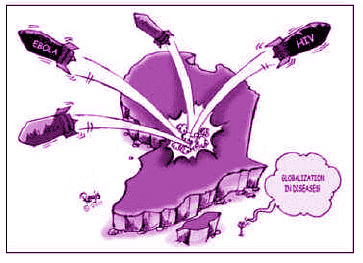Passage Based Questions: Globalisation - 2 | Political Science Class 12 - Humanities/Arts PDF Download
Passage - 1
Direction: Examine the cartoon carefully and respond to the following questions:
(i) What are the various dimensions of globalization?
Ans: In 2000, the International Monetary Fund (IMF) identified four fundamental aspects of globalization: trade and transactions, capital and investment movements, migration and movement of people, and the dissemination of knowledge.
(ii) How do diseases influence globalization?
Ans: While globalization increases the risk of spreading diseases, it also facilitates the discovery of effective and rapid cures through the collaboration of medical facilities and knowledge-sharing among countries. A notable example is the development of the Covid-19 vaccine.
(iii) Why is Africa highlighted in the picture? (Provide any two reasons)
Ans: Africa is featured in the given picture because it is one of the most affected regions by poverty compared to other parts of the world, and the diseases depicted in the picture have their epicenter in Africa.
(iv) Provide an example of how globalization has impacted your life today.
Ans: Due to globalization, I can access the internet and gather information from any part of the world.
Passage - 2
Direction: Read the passage below and answer the following questions:
Globalisation as a concept fundamentally deals with flows. These flows could be of various kinds: Ideas moving from one part of the world to another, capital shunted between two or more places, commodities being traded across borders, and people moving in search of better livelihoods to different parts of the world. The crucial element is the worldwide ‘interconnectedness’ that is created and sustained as a consequence of these constant flows. Globalisation is a multidimensional concept. It has political, economic and cultural manifestations and these must be adequately distinguished.
(i) Explain why globalization is considered a multidimensional concept.
Ans: Globalization is a multidimensional concept with political, economic, and cultural aspects. It cannot be defined solely as an economic or cultural phenomenon.
(ii) In globalization, the key factor is 'worldwide interconnectedness.' Support this statement with two suitable examples.
Ans: (i) People come to depend on foreign industry to provide them with employment. (ii) Nations begin to rely on each other for things they cannot produce themselves.
(iii) How did the disintegration of the USSR contribute to the spread of globalization globally?
Ans: The disintegration of the USSR aided the spread of globalization worldwide in the following ways:
(a) With the collapse of the USSR and the fall of communist regimes in Eastern European countries, communism was replaced by capitalism.
(b) The spread of capitalism to the Second World further accelerated the process of globalization.
Passage - 3
Direction: Examine the picture below and respond to the following questions:
(i) What does the image illustrate?
Ans: The image illustrates the changing scenario due to globalization.
(ii) What is meant by the title ‘Yesterday’?
Ans: The title ‘Yesterday’ refers to the earlier conditions of developing countries that were suffering due to slow economic growth.
(iii) What does the title ‘Today’ signify?
Ans: The title ‘Today’ suggests that globalization has opened doors for new entrants from developing nations, leading to a brain drain from these countries.
|
34 videos|276 docs|51 tests
|
FAQs on Passage Based Questions: Globalisation - 2 - Political Science Class 12 - Humanities/Arts
| 1. What is globalization and how does it impact different cultures? |  |
| 2. What are the positive effects of globalization on the economy? |  |
| 3. How does globalization affect local jobs and employment? |  |
| 4. What role does technology play in globalization? |  |
| 5. How can cultures maintain their identity in a globalized world? |  |




















